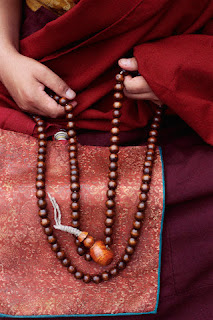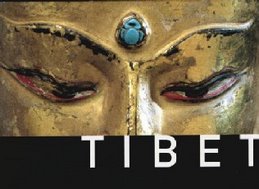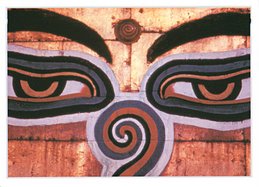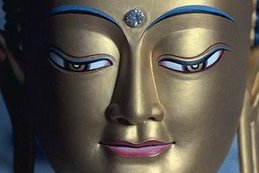
The King of Kosala had an adviser called Bhaggawa. Bhaggawa had a wife called Mantani and a son called Ahinsaka.
When Ahinsaka was born, all the weapons in the country shone brightly. The king was disturbed by this, and the next morning he called his adviser to find out the reason why the weapons were shiny. The adviser said, "My wife has given birth to a son, Your Majesty."
"Then why do the weapons shine in such a manner?" asked the king.
"Your Majesty, my son will be a bandit."
"Will he rob alone or with a gang?" asked the king.
"He will be single-handed, Your Majesty," replied Bhaggawa.
"We should kill him now," said the king.
"No!" exclaimed Bhaggawa, "As he will be alone we shall be able to catch him easily."
When Ahinsaka was old enough his father sent him to a school in Takka Sila. Ahinsaka was the strongest, brightest and the most obedient child of all the children in the whole school. Other children became envious of him and behind his back made the teacher hate him. Thus, when he had finished his education, the teacher said, "Now you must pay me my tuition fee."
"How much should I pay, Sir?" asked Ahinsaka.
"I don’t want cash but one thousand right-hand human fingers. And remember not to bring two right-hand human fingers from the same person."
Although it was a most difficult thing for him to do, Ahinsaka promised to pay his teacher. Taking a sword, off he went until he reached Kosala.
Hiding near a jungle highway, he waited for passers by. He would rush out and kill them, cutting off a right-hand finger and hanging their corpses on a tree for the vultures and crows. He made a garland out of the finger bones and soon became known as "Angulimala" (anguli=fingers, mala=garland).
Angulimala went to another district and began to kill again. Because he was murdering so many people, the King of Kosala decided to go with his strong army and capture the bandit. When Mantani heard this she went to her husband to try to get him to save their son.
"Darling, he is very fierce now," said Bhaggawa. "He may have changed completely, and if I go there he may even kill me." But the mother was very soft hearted and loved her son more than she loved herself. She thought, "I must go to the jungle myself and save him."
Now Angulimala had killed 999 people. He had spent months and months in the jungle without proper food, sleep or comfort, so he was impatient to pay off his debt and live a decent life. He thought, "Today if even my own mother comes I will kill her and cut off a finger to make one thousand fingers."
Now that day, while the Buddha looked round the world to see if anybody needed help, he saw Angulimala and his mother. "I must save them," he thought as he set out towards the jungle.
The villagers, seeing the Buddha, cried out, "Teacher, don’t go that way, it is too dangerous. Return home quickly." Three times they warned him but the Buddha continued, thanking them for their concern.
Now Angulimala’s mother entered the jungle. Angulimala saw her coming and thought, "Poor lady. She comes alone. I pity her but it cannot be helped . I must keep my word and kill her." All of a sudden, the Buddha appeared between them. Angulimala thought, "It is very good that this ascetic comes before my mother. Why should I kill her? I will leave her alone and kill this stranger." And with his sword he ran towards the Buddha. The Buddha walked slowly before him, thinking, "Let this young man see me running." So Angulimala ran and ran towards the Buddha, but he could not catch up with him. He became so weak that he could not run any further. Then he shouted at the Buddha, "Stop! Stand still!"
"I stand still, Angulimala! Do you also stand still?" said the Buddha.
Angulimala could not understand the meaning of the Buddha’s words, so he asked him, "How can you say you stand still while running faster than me?"
"I stand still Angulimala evermore,For I am merciful to all living beings;But you are merciless to living beings.Therefore I stand still and you stand not still."
Angulimala was very pleased with what the Buddha said and throwing away his sword knelt before him. The Buddha blessed him and took him to the monastery, where he became a monk.
Meanwhile, the king was waiting with his army at the palace to receive the Buddha's blessing before setting out to the jungle. When the Buddha did not come, he went to the monastery with his five hundred horses and soldiers. The Buddha asked him, "What is it that troubles you, mighty King?"
"There is a most fierce killer called Angulimala and I am going to catch him."
"But mighty King, suppose you see Angulimala head shaven, wearing yellow robes. What would you do to him?"
"I would worship him," answered the king.
Then the Buddha called Angulimala and the frightened soldiers started to run away. But the Buddha stopped them, and taught the Dharma to them all.
 More than 2,500 years ago, there was a king called Suddhodana. He married a beautiful Koliyan princess named Maha Maya. The couple ruled over the Sakyas, a warrior tribe living next to the Koliya tribe, in the north of India, in what is now known as Nepal. The capital of the Sakya country was laid out across the foothills of the Himalayas and called Kapilavatthu.
More than 2,500 years ago, there was a king called Suddhodana. He married a beautiful Koliyan princess named Maha Maya. The couple ruled over the Sakyas, a warrior tribe living next to the Koliya tribe, in the north of India, in what is now known as Nepal. The capital of the Sakya country was laid out across the foothills of the Himalayas and called Kapilavatthu.





















 On the third day after the Buddha's return to Kapilavatthu he was invited to the wedding of Prince Nanda, his youngest stepbrother, and his new bride, Princess Janapada Kalyani. The Buddha attended the wedding and celebrations, blessed them all, left his begging bowl with Nanda and went away.
On the third day after the Buddha's return to Kapilavatthu he was invited to the wedding of Prince Nanda, his youngest stepbrother, and his new bride, Princess Janapada Kalyani. The Buddha attended the wedding and celebrations, blessed them all, left his begging bowl with Nanda and went away.











